“I have an idea for an app. How much does it cost to develop an app? Where do I find investors and tech angels? How do I raise app funding?”
These are the most frequent questions I often get asked whenever I meet with startup founders or product owners and budding creators. You’d be surprised to know that app and software development agencies are asked by entrepreneurs about getting financial resources and pitching to potential investors as often as asking about their tech stack, workflow, and estimates.
This is why we regularly organize events and join developer and startup communities to lend our experience. We share our real-life success stories, the gambles we took, and lessons we learned working with founders who’ve been in the same shoes. Some of these same founders became our long-time partners, even accompanying us to our own events!
In all my fireside chats and talks with founders, I’ve unearthed several patterns when we converse about where they are at the app development stage. A lot have already pinned down their ideas and business models, many are creating (or improving) their minimum viable products (MVPs), and some are just starting to survey the lay of the land. A couple or so are only beginning development.
Their common denominator? Funding.
Startups already deal with a lot of costs to survive. Finding a reliable team of developers and designers is hard and frustrating enough, let alone raising money to fund and start building the app in the first place.
So, I’ve come up with this simple list of viable options for startup founders and budding entrepreneurs looking for ways to turn an app idea into reality and raising the capital needed to launch the app. There are a lot of factors at play, including your immediate and future needs, personality, and your own app ideas. Don’t get discouraged if they don’t work out! There will always be an alternative as long as you put your (positive) mind into it!
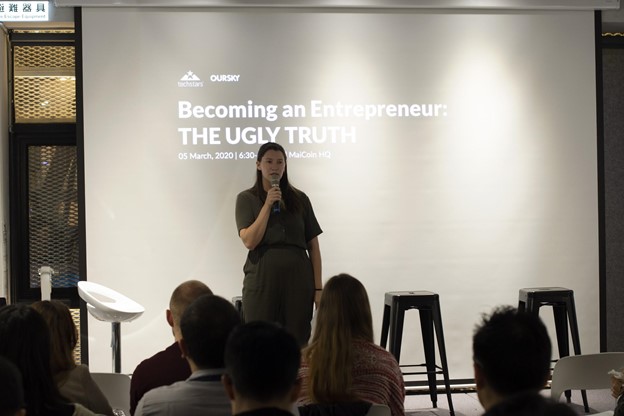
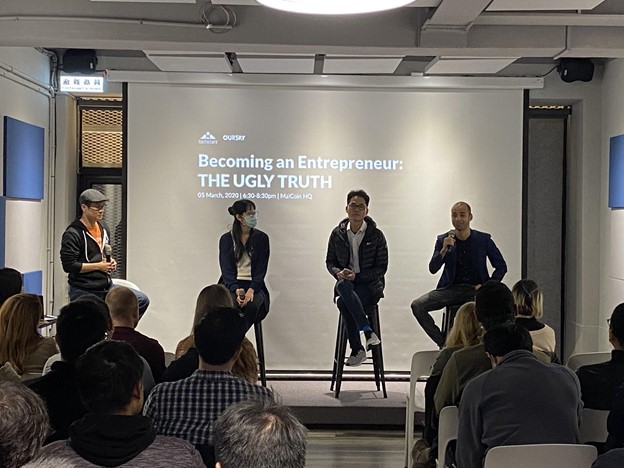
Startup Funding: Options for Getting Investment for Your App
So, let’s say you’ve validated your ideas. You know the problems. You have a concrete plan to solve them, and your app will answer these needs. The obvious next step is to know how to raise money for the business.
Here are some of the ways you can have the resources you need to bring that app to life:
Issuing Convertible Bond
“Convertible bond” or “convertible debt,” in this case, means the investor gets equity or shares of the startup’s stocks in return for their investment.
Convertible bond is a type of security and is a good option for startup founders who don’t want to waste resources networking and pitching to potential investors. You hire a team, and after the company becomes profitable or raises capital, each team member gets payment according to the amount of hours spent on the project. The caveat? You need to be 100% sure that the idea is going to work. I personally know a startup founder who’s adopting this approach and is currently working with a team of developers to build the app.
Fund Your App by Self-Financing and Bootstrapping
Self-financing and bootstrapping a startup indicates growing your company without outside investment.
If you’re still working on your daily job, for example, you can spend some of your savings building prototypes from no-code app development solutions or hiring freelance developers. Rates vary dramatically based on the location and qualification. Decent full-stack developers in Europe will charge about US$30 per hour, which means you need at least US$5,000 for every month of work. If the freelancer developer has clear requirements, they should be able to complete a MVP within two to three months. The timeline varies depending on the project’s scope. You should be able to create a requirement specification for your project.
On the upside, many of today’s successful startups had their humble beginnings as a self-funded, including GoPro, Basecamp, and Mailchimp.
Pitching to Tech Angels
There are so many people out there looking to invest into cool and meaningful projects. In fact, I know a couple of them. These people are angel investors (aka private investors, seed investors, angel funders). If you know any, personally approach them for a chat about your project. If you don’t, a good way to start your search would be angel investor communities.
If you’re in the UK, there are various angel investment networks you can explore, as well as tech angel investors you can reach out to. Seedrs, a crowdfunding platform, has a list of angel investment networks in London that you can tap into. Note that while angel investors in the UK still have an appetite for investing in startups, the COVID-19 pandemic is compelling them to rethink or recalibrate their plans. For more actionable insights on angel investments in the UK, check out this resource from Activate our Angels (AoA).
Joining a Business Incubator
Business incubation is an umbrella term for a wide range of support provided by different organizations, not only the services offered by the incubator.
Incubators usually help in polishing your idea, choosing better ways to monetize it, finding the right product market fit, and building a team. Incubators usually target early-stage startups to help them with resources and community support. Founders who enroll with incubators get to talk to mentors, investors, and other founders who’ve been on the same journey, which in itself brings a lot of value and opportunity to look at their projects from different angles.
The UK government created an online directory that’ll make it easy for you to search for incubator and accelerator programs that could be suitable for your needs based on your location, duration, and price, among others.
Scaling Your Startup: Accelerators, venture capitals, startup grants, crowdfunding
These types of funding are for startups that have already found a product-market fit, built an MVP (or in the process of building one), got feedback from early adopters, and proved that the digital product solves real needs. In these stages, founders need the funds to accelerate the startup’s growth, enter new markets, and enhance the technology and product with new features.
Getting into a Startup Accelerator
Unlike incubators, accelerators usually provide support through a highly selective, cohort-based program with limited duration. Services often include assistance in developing the business plans, investor pitch decks, prototypes, and initial market testing. Accelerators sometimes provide seed-round investments in exchange for equity.
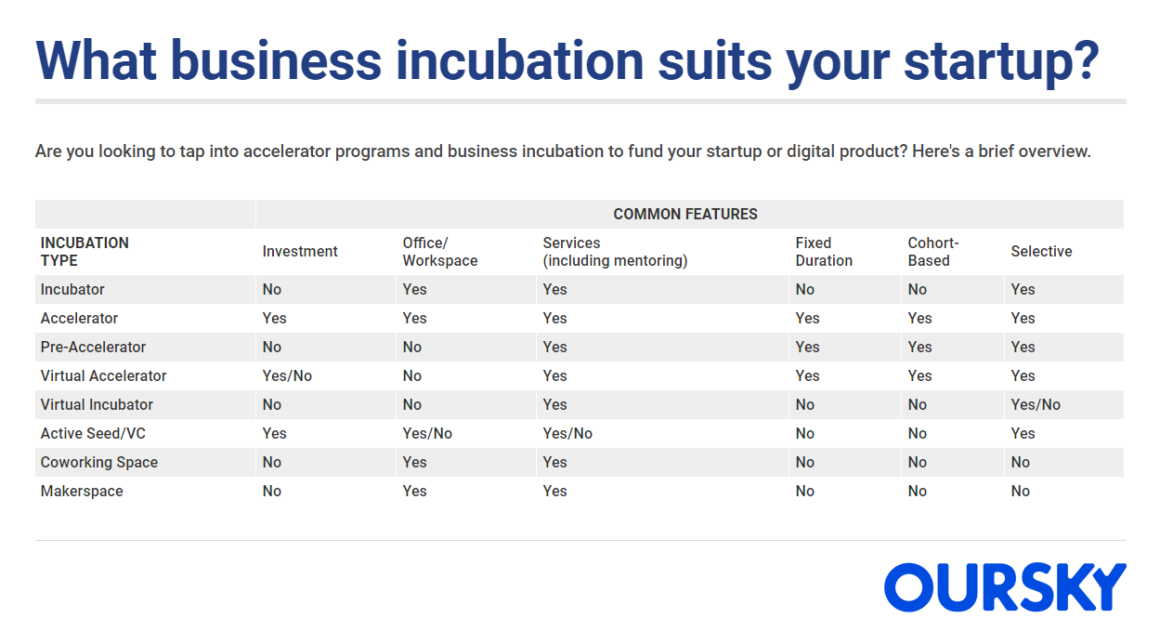
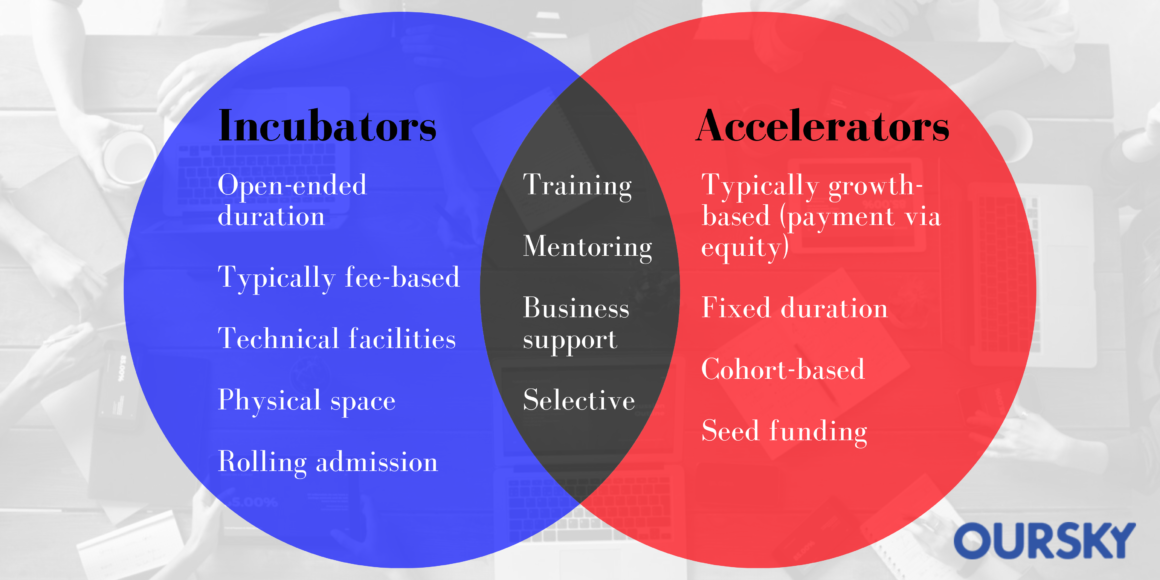
Venture Capital Funding
Venture capitals (VC) are a hard nut to crack. They want the next “unicorn,” looking for bold, ambitious, and courageous founders with novel ideas and strong teams. If you want to get VC-backed and into the space of venture capitalists, you need to network a lot. They always prefer warm introductions and attending events. Talk with as many venture capitalists as possible. Make sure that your idea is scalable and solves real problems while keeping your solution novel and hard to replicate.
Government Grants for Startups
Government agencies around the world provide perks and financial grants and startup loans in setting up new businesses. They vary significantly based on the local authorities that provide them and the industries they cater to.
If you’re in the European Union (EU), there’s a comprehensive list of publicly backed and private business grants and funding programs. The UK government, too, has an online portal for funding programs you can filter depending on the type of support you need, your industry, and region.
If your startup and app/software idea is along the lines of Fintech (e.g., direct/virtual banking, online and mobile banking), you’d be happy to know that the UK government will support you through Open Banking.
Crowdfunding for Business
This can be your viable option if you already have an MVP and want to complete and deliver the product. There are usually two kinds of crowdfunding models: You sell a part of the company as debt or equity in exchange for money; or you collect donations from people to fund your startup and provide them the finished product.
Both require completely different business models and approaches. The first one is pretty similar to raising money from VCs, because the conditions are almost the same. However, don’t think of it as an easier option to go for crowdfunding. It requires a lot of marketing, PR, direct communication with your target audience, and a very good understanding of what you’re selling. The Startup Grind, a global community for entrepreneurs, has a list of crowdfunding platforms you can explore.
Female Entrepreneurs
A Crunchbase report said that 97% of all funding goes to male founders. It’s very important to bridge this gap, which is why there are more and more programs for underrepresented entrepreneurs. If you are a female founder or a person of color, there are plenty of options available to fund your venture, including private and government-backed loans and business grants.
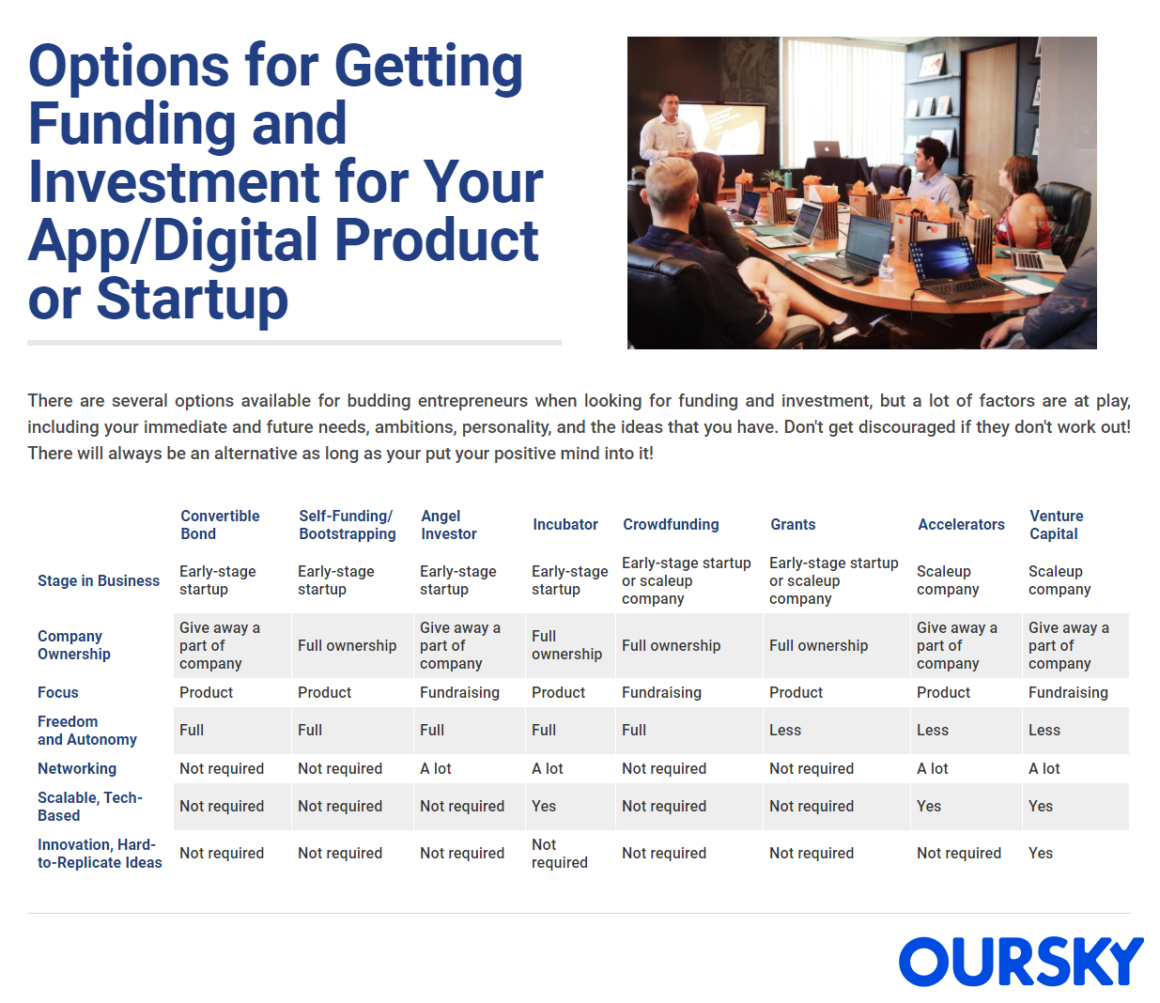
How long does it take to get funding for a startup?
A common timeline would be six months. Many startups raise funds every year, and most just raise enough to achieve an immediate milestone. Getting a startup funded is a constantly moving process that can take 12 to 18 months per funding round. Some take at least 90 days (and as long as nine months) from initial pitches to the actual funds. Just scheduling a meeting with a potential VC firm can take weeks, not to mention that meetings, conversations, and negotiations that follow.
Many entrepreneurs end up waiting too long and unfortunately go bust or move on to other ventures. Fundraising is time-consuming, so it’s very important to schedule your activities as effectively as possible and prepare everything that you need, like pitch decks and project specification, well ahead in advance.
How to Get App Investors
A good starting point is doing your research and compiling a list that you will reach out to once you’ve finalized your idea and determined your startup’s future. You can start with business schools and universities with strong entrepreneurial programs, which usually have a network of investors and successful entrepreneurs. You can also sign up the help of your friends and family, contact industry colleagues, and join regional groups and startup communities.
Before reaching out to these investors, determine if:
- They know your market.
- They’ve invested in a similar project or industry.
- They’ve invested in competitors and future or potential clients and partners.
- They’re experts behind the technologies you’ll use.
These will help you focus on things that matter most and filter the people you’ll talk to, which will help you save time and lessen your frustrations.
Must-Haves for Pitching App Ideas
An idea is only as good as how it’s conveyed, and that’s especially true to startup founders. Here are some must-haves when pitching.
A pitch deck, the one that can make or break your startup, should include: your value proposition, how your idea will solve problems, customer journey and stories, business model, milestones, and the numbers behind your own numbers.
Investors also capitalize on the people who bring ideas to life. Share details about your rock star team, the skill sets that would complement your current team, and the overall structure of the company.
Why a Good App Design Matters
Amidst tight deadlines, limited resources, and busy schedules of launching the startup, user interface and user experience (UI/UX) could be the last thing on an entrepreneur’s mind. They should not.
Regardless of what kind of digital product you’re creating, the ultimate goal is to attract potential clients. They only become loyal customers if they’re happy and satisfied with your product. App design is not just about what icons go to what part of the screen. A good UI/UX design reflects the problems you are trying to solve and gives insights into how your customers will interact with your product. There’s more to UI/UX design than creating a visual identity — it maps out the user journey that enables your investors to visualize how customers will use your product.
A poor UI/UX is a red flag: 70% of online businesses fail because of bad usability, while delivering a product that is not user-friendly is cited as one of the top reasons why startups fail.
Successful Entrepreneur Stories to Inspire Your Startup
Over the years, we’ve helped different startup founders develop and launch their digital products that, in turn, helped them secure funding. We worked with Johnny Quattro, MiQ Limited’s founder, to build the Jamn PLAYER, an award-winning iOS music app. At the time, no other software development agencies were interested in partnering with Johnny as the technologies and expertise needed to bring the app to life was deemed outlandish.
Luckily, our design lead was a music enthusiast, and thought it would be a very cool project to do. After working with an MVP for the app, Johnny was able to secure an equity-based funding. The app garnered over 3 million downloads within six months after it was launched. We also helped Johnny build the technical team for his own startup.
Another success story was a UK-based online marketplace platform. The app we helped develop won Apple’s Best of App Store under the leisure category. Through an iterative approach, we were able to constantly improve the app, and even outfitting it with an artificial intelligence-based (AI) recommendation engine. With a robustly designed MVP and prototype, they presented their idea and successfully secured the financial resources they needed from app investors to improve and expand their platform.
Getting your startup and digital product funded involves time-consuming and complex processes and trade-offs between short- and long-term costs, returns on investment, and ownership. It sure is a lot of hard work, and you need the right tools and partner to help you.
Ourskyers are all about helping entrepreneurs, creators, startup founders, and product owners bring their ideas to life — get in touch with us!
Like this article? Subscribe to Oursky for more expert advice and dev and business hacks!
Disclaimer: This post, originally published in the Oursky blog, was cross-posted on Startup Victoria as part of stories and articles for startup founders.










